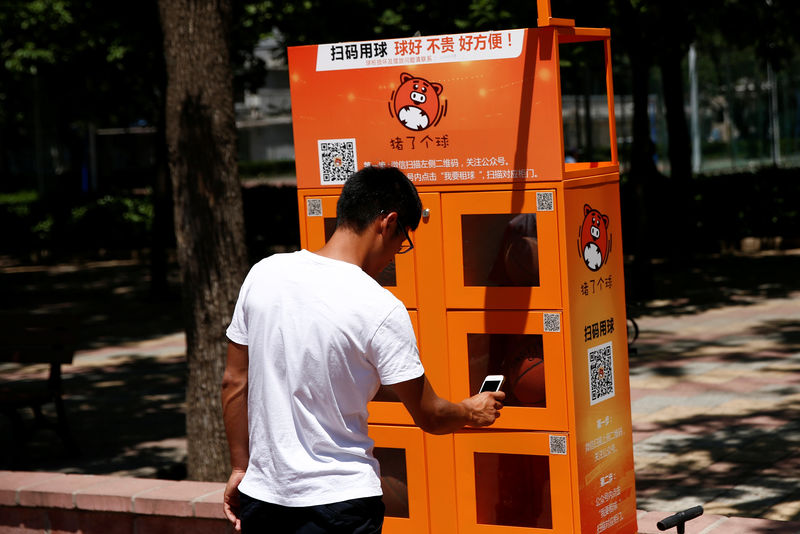By Yawen Chen and Ryan Woo
BEIJING (Reuters) - Fancy shooting some hoops, but don't have a basketball? Caught in the rain with no umbrella? Smartphone run out of juice?
China's rapidly expanding "sharing economy", which already provides car rides and bicycle hire on demand, can help.
For just 2 yuan ($0.30) an hour, Nate Liu, a student at the Beijing Language and Culture University, rents a basketball from a court-side vending machine by scanning a barcode on his smartphone.
"I didn't want to ask around and borrow a ball after losing mine, so I decided to give it a try," Liu told Reuters.
Far away, in China's wetter south, some 20,000 umbrellas have been released on to the streets of Shenzhen, and can be rented - unlocked by another smartphone barcode scan - for just half a yuan ($0.07) for 30 minutes.
The umbrellas can be dropped off "wherever convenient", though users are encouraged to keep them, says Zhao Shuping, founder of E Umbrella Sharing, one of a handful of start-ups offering the service.
China's government has taken notice, and expects the "sharing economy" to grow about 40 percent this year to 4.83 trillion yuan ($705 billion). By 2020, it should account for around one tenth of GDP, illustrating China's aspiration to become a sharing economy leader on a global scale.
PricewaterhouseCoopers predicts five sharing sectors - car sharing, travel, finance, staffing, and music and video streaming - have the potential to increase global revenue to $335 billion by 2025 from $15 billion today.
Most of the money behind China's ballooning sharing economy comes from angel investors and venture capital firms.
At least 1.69 billion yuan ($247 million) in mostly series-A, or early stage, funding was invested in April-May in over two dozen start-ups offering sharing services, according to Reuters calculations based on data from Chinese data firm IT Juzi.
Twelve firms renting out power banks - typically compact, mobile battery chargers - secured 1.13 billion yuan, while newer businesses such as basketball and umbrella-sharing took in about 25 million yuan ($3.65 million) combined.
While mobile-savvy, convenience-obsessed Chinese welcome the innovations, some critics question whether the demand is real, or sustainable. They say the low-revenue, capital-intensive model means profitability can be elusive.
"Young people are embracing renting as a way of life instead of possessing things," said Emma Zhu, investment director at Beijing-based Innoangel fund, who has held off investing in any of these start-ups. "But the sharing model won't work in every situation. In some cases, they're trying to meet genuine demand, while in others they're not."
Some investors say the funding frenzy recalls the spectacular boom and bust of hundreds of Chinese Groupon apps in vogue in 2010-12, noting that most ultimately collapsed after fierce price wars, with losses of around $1 billion.
"In China, the only barrier to entry is who can raise the most capital - that's good and bad," said Xu Miaocheng, an investment manager at Unity Ventures in Beijing.
"The upside is, there are funds available to launch a bunch of companies. You may not need a lot of specialization or new technology. The downside is a lot of money could be wasted."
"SPEED IS EVERYTHING"
Cai Min, founder of basketball rental firm Zhulegeqiu, says he wants to expand nationwide, and quickly, offering the service at all of China's estimated 100,000 basketball courts, and growing into a multi-billion yuan business, eventually offering all "sharable" products.
The Zhejiang-based start-up received 10 million yuan ($1.46 million) in early funding from Shanghai-based Modern Capital on May 5, less than two months after Cai came up with the idea.
"We are expanding at all cost, because speed is everything," Cai told Reuters. "Of course this means costs have been very high at the early stage because we have to make everything in a month."
He declined to give specific figures, but each of the solar-powered basketball rental machines - currently in Beijing, Shanghai, Hangzhou, Tianjin and Chengdu – costs "a few thousand yuan."
"The key to success is to get more money than your competitors and to expand faster than them," he said.
Even some keen players, though, have their doubts, saying balls are only used occasionally, so the need to rent is marginal.
All sharing services require a one-time deposit - from 99 yuan ($14.45) for a shared basketball - that gives sharing companies a one-off financial buffer that critics say won't be sufficient in the longer run if profits are slow to take off.
The latest wave of "sharing" entrepreneurs has been largely inspired by the rapid rise of Chinese bike-sharing firms such as Mobike and ofo, which have together raised close to 13 billion yuan in a little over two years, extending their services to more Chinese cities and international markets including London and Singapore.
E Umbrella's Zhao said he came up with the idea after his three young children rushed to try out the rental bikes that mushroomed across Shenzhen early this year. "I thought: they're just normal bikes, if this could work, why can't shared umbrellas?" he said.
Zhao, who patented his coded lock umbrellas in March, said umbrella and lock manufacturers are fighting for his orders, offering him payment exemption for as long as 30 days.
"My cost for the umbrellas is basically zero right now," he said, adding he hopes to release a "modest" 30 million umbrellas across southern China this year.
He says his business has already attracted interest from potential partners such as China Life Insurance Co (SA:601628), which wants to replicate the model in markets from Hong Kong to Singapore.
